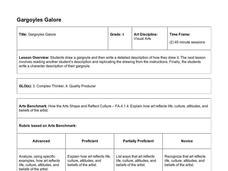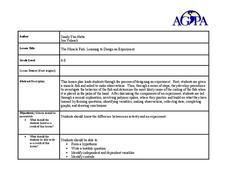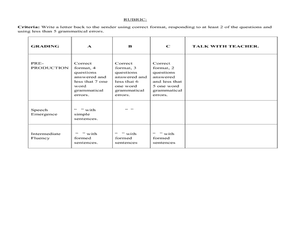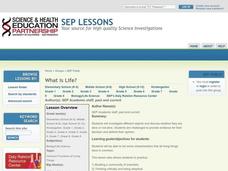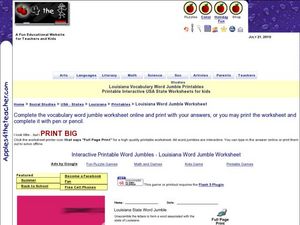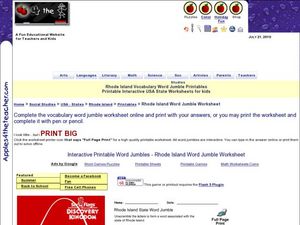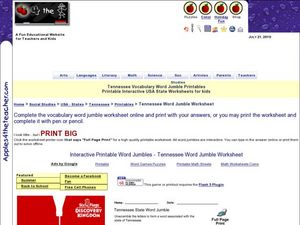Hawaiʻi State Department of Education
Angles on Kandinsky
Not only is Wassily Kandinsky fun to say, his art contains tons of angles. Learners discuss Kandinsky's music-inspired abstract art and four types of angles. They search one of his paintings for obtuse, right, straight, and acute angles,...
Hawaiʻi State Department of Education
Gargoyles Galore
Grrrrr, gargoyles are on the loose! Young artists are familiarized with the history of gargoyles, examine pictures of them, and hear a story about them. Then, they draw a gargoyle and write down exactly how they did it (procedural...
Washington State University
Defining Bullying
How can you recognize bullying? How is verbal bullying different from physical or social bullying, and when has a joke gone too far? Learners use their own experiences and ideas to inform the discussion.
Virginia Department of Education
Integers: Addition and Subtraction
Young mathematicians construct their own understanding of integers with an inquiry-based math lesson. Using colored chips to represent positive and negative numbers, children model a series of addition and subtraction problems as they...
Virginia Department of Education
Transformations
Geometry in life-sized dimensions! Using enlarged graph paper, pupils perform a series of transformations. By recording the initial and final placement of the images, they are able to analyze the patterns in the coordinates during a...
Virginia Department of Education
Quadrilateral Sort
If only you had a Sorting Hat to sort out quadrilaterals. Learners sort cutouts of quadrilaterals based on their properties and attributes. A flowchart helps them organize the results of the activity.
Cornell University
Thin Films
Combine mathematics and science to calculate measurements of unmeasurable materials. Individuals use knowledge of density and volume to determine the thickness of the film used in production. They also apply stoichiometry to determine...
Curated OER
The Miracle Fish: Learning to Design an Experiment
Learners develop procedures to explore the behavior of fish. In this scientific experiment lesson students from a hypothesis, write a question, identify different variables and controls in their experiment.
Curated OER
Write Right Back
Third graders explore communications by utilizing technology. In this e-mail writing lesson, 3rd graders identify important elements to include when writing an e-mail based on whether it's to a friend, colleague or employer. Students...
Curated OER
The Seasons of the Year
Students learn about the four seasons. They collaborate in pairs, publish a book, and share with the class. They also brainstorm and collaborate with each other providing literacy skills through listening, speaking and writing activities.
Curated OER
The Miracle Worker
Eighth graders participate in a layered curriculum novel study on "The Miracle Worker". The students can choose from a variety of studies and assessments. This make the lesson more differentiated for multiple levels.
Curated OER
Headlines of the Past
Young scholars study the lives of four Native cultures. They examine the people that inhabited Wisconsin over the last 12,000 years. They create a newspaper and imagine themselves as a reporter living during this time period and sharing...
Curated OER
Digan Queso
Students work in groups with the assigned roles of either a photographer or a family member. The photographer gives commands in Spanish designating family members to follow where to stand for a family photo.
Curated OER
Mapping Deep-Sea Habitat
Students create a two-dimensional topographic map and a 3-D model of landforms. In this creative lesson students create 2 and 3-D objects and learn how to interpret the data from these things.
Curated OER
Let's Make a Tubeworm!
Students discuss deep-sea chemosynthetic communities then create a poster of a three-dimensional tubeworm. In this creative lesson students create their own tubeworm and write a written report on it.
Curated OER
What is Life?
Students investigate the characteristics of living things. In this life science lesson, students examine several living and non-living specimens. Students determine which things are living and non-living.
Curated OER
Iowa word jumble
For this Iowa worksheet, students unscramble the words that represent Iowa's history. Students unscramble 20 words that represent the state of Iowa.
Curated OER
Louisiana State Word Jumble
In this word jumble worksheet, students unscramble the letters to spell words associated with the state of Louisiana. Students spell 20 words.
Curated OER
Rhode Island Word Jumble
In this Rhode Island worksheet, students unscramble words that represent Rhode Island landmarks and history. Students unscramble 20 words.
Curated OER
Tennessee Word Jumble
In this Tennessee learning exercise, students unscramble words that have to do with Tennessee's history. Students unscramble 20 words.
Curated OER
Regular Polygons
Fifth graders explore polygons. In this math lesson, 5th graders find examples of regular polygons in the classroom and measure the sides of figures to determine if they are regular polygons.
Curated OER
Reading the Waves
Students view video segments which reveal the parts of sound and what factors control sound. The viewing and post-viewing activities serve to reinforce the video segments using worksheets and hands-out experiments.
Curated OER
The Sun: An Introduction
Students write entries in their Science Journals as they explore the Sun.
Curated OER
Stereotypes and Cross-Cultural Understanding
Students are introduced to the topic of stereotypes. After reading an article, they complete a chart filling out the appropriate sections. They participate in a class discussion about how to eliminate as many stereotypes as they are...



